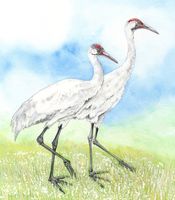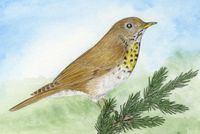
Beluga
Latin name: Delphinapterus Leucas ,Conservsation status: near threatened (population is unknown)
Belugas make such a variety of sounds—clicks, twitters, whistles, and mimics of other sounds—they have been nicknamed "sea canaries." As much as 40% of their body mass is blubber, which stores energy and keeps them warm in temperatures as low as 0 °C. The smallest whale on the planet, a baby Beluga gains up to 200 pounds a day.
Belugas live in Arctic and Sub-Arctic waters. Impacts from climate change include: an increase in ship traffic as sea ice declines, oil exploration and extraction, fisheries by-catch, and disruption of the food web. As Arctic waters warm and currents change, the Humpback (a competitor) and the Orca (a predator) may move north and stay longer. Some Beluga populations are also threatened by hunting, pollution and habitat loss.
Other animals effected by climate change
 Whooping Crane
Whooping CraneBefore 1800 there were an estimated 10–20,000 Whooping Cranes in North America. By 1941, because of hunting and habitat destruction, there were fewer than 20. There are now approximately 350–380 in the wild. The wild Whooping Crane population has only one winter habitat—a wildlife refuge on the Gulf Coast in Texas; and one spring breeding habitat—a prairie wetlands in Alberta. Severe storms, sea level rise, drought, industrial development and oil spills threaten these habitats. Another significant threat to young Whooping Cranes is colliding with power lines in their migration corridor.
 Bicknells Thrush
Bicknells ThrushThe breeding habitat of Bicknell's Thrush is primarily restricted to mountain spruce forests of Northeastern US and Canada. They winter in the Caribbean and spring migration north is cued by day length. If spring arrives early in the north and the Thrushes arrive at their normal time, the abundance of food—insects and fruit—would already have peaked. Warming temperatures also produce an abundance of spruce and fir cones—feeding and increasing the population of Red Squirrels, a main predator of eggs and chicks. Storms and hurricanes threaten the Thrush's tropical winter habitat. Pollution, logging and deforestation threaten their spring breeding and winter habitats.
 Narwhal
NarwhalThe Narwhal lives mainly in the Atlantic Arctic. Because of specialized habitat, narrow range and limited diet (Arctic cod and halibut), it is one of the Arctic species most vulnerable to climate change. The Narwhal breeds in bays and fjords, moving offshore during winter to areas of heavy ice pack, breathing through the few cracks. Sudden or extreme temperature change can cause these cracks to freeze shut, trapping the whales. Other threats are illegal hunting, industrial activities, and risks from oil development, exploration and shipping in the Arctic.
 Sockeye Salmon
Sockeye SalmonFor decades wild salmon populations have been in decline from human causes: over fishing; habitat degradation—logging, mining, agriculture and dams; pollution; and interaction with hatchery or farmed salmon. These conditions and threats may hinder their ability to adapt to the effects of climate change. Salmon thrive at specific freshwater temperatures—warming air raises water temperature. Early snow melt and increased rains cause physical changes to spawning streams.
